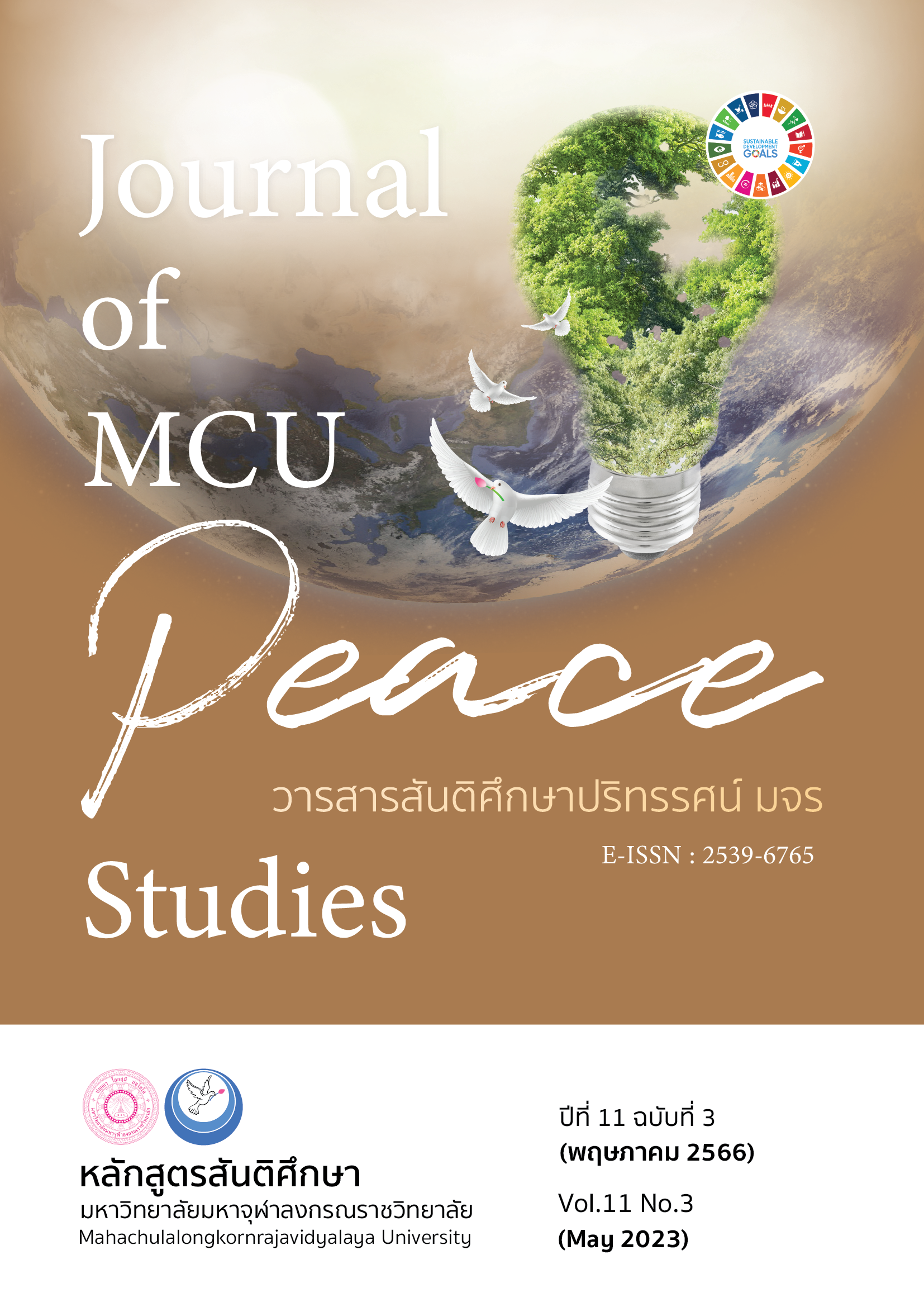พัฒนาฐานข้อมูลในรูปแบบดิจิทัลเพื่อการจัดการสู่ชุมชมปลอดขยะวิถีพุทธ ภายใต้แนวคิดเศรษฐกิจหมุนเวียน
Main Article Content
บทคัดย่อ
บทความวิจัยนี้มีวัตถุประสงค์เพื่อ 1) ศึกษาฐานข้อมูลด้านการจัดการขยะของชุมชนปลอดขยะวิถีพุทธ 2) พัฒนาฐานข้อมูลด้านการจัดการขยะของชุมชนปลอดขยะวิถีพุทธในรูปแบบดิจิทัล ใช้การวิจัยเชิงคุณภาพ โดยศึกษาจากเอกสารต่างๆ และ สัมภาษณ์เชิงลึกผู้นำชุมชน ชาวบ้าน จำนวน 27 คน จากชุมชนปลอดขยะ Zero Waste 9 ชุมชน แล้ววิเคราะห์สังเคราะห์ข้อมูลตามวัตถุประสงค์
ผลการวิจัยพบว่า 1) ฐานข้อมูลด้านการจัดการขยะของชุมชนปลอดขยะวิถีพุทธ มี 3 ฐานข้อมูล ดังนี้ (1) ฐานข้อมูลด้านการจัดการขยะของชุมชนปลอดขยะ Zero Waste เป็นฐานข้อมูลที่สะท้อนให้เห็นภาพรวมเกี่ยวกับการจัดการขยะของชุมชนปลอดขยะ Zero Waste ในประเด็นต่างๆ เช่น ในอดีตที่ผ่านมา ชุมชนได้รับผลกระทบจากปัญหาขยะ ต่อมา ชุมชนก็ลุกขึ้นมาแก้ไขปัญหาขยะจนประสบความสำเร็จ (2) ฐานข้อมูล ด้านความเป็นชุมชนปลอดขยะวิถีพุทธของชุมชนปลอดขยะ Zero Waste เป็นฐานข้อมูลที่สะท้อนให้เห็นความเป็นชุมชนวิถีพุทธของชุมชนปลอดขยะ Zero Waste ที่นำหลักธรรมทางพระพุทธศาสนามาใช้ในชีวิตประจำวัน เช่น ศีล 5 ความซื่อสัตย์ ความอดทน ความรับผิดชอบต่อสังคม ความสามัคคี เป็นต้น (3) ฐานข้อมูลด้านชุดความรู้เกี่ยวกับการจัดการขยะ เป็นฐานข้อมูลที่ให้ความรู้ที่สำคัญต่อการจัดการขยะ เช่น การจัดการขยะตามหลัก 3Rs ได้แก่ ลดใช้ ใช้ซ้ำ นำกลับมาใช้ใหม่ หรือ กิจกรรมการนำขยะกลับมาใช้ประโยชน์ เช่น การนำซองกาแฟมาแปรรูปเป็นหมวก เป็นต้น 2) ฐานข้อมูลด้านการจัดการขยะของชุมชนปลอดขยะวิถีพุทธในรูปแบบดิจิทัล มี 3 ฐานข้อมูล ดังนี้ (1) ฐานข้อมูลดิจิทัลด้านการจัดการขยะของชุมชนปลอดขยะ Zero Waste เป็นฐานข้อมูลที่เล่าเรื่องราวการจัดการขยะของชุมชนปลอดขยะ Zero Waste ด้วยการเล่าแบบภาษาง่ายๆ มีหัวข้อน่าสนใจ พร้อมกับมีภาพกิจกรรมในชุมชนประกอบการเล่า ยกตัวอย่างหัวข้อที่น่าสนใจ เช่น เรื่องเล่าความหลัง: ปัญหาขยะคือแรงขับเคลื่อนสู่การพัฒนาชุมชน (2) ฐานข้อมูลดิจิทัลด้านองค์ความรู้เกี่ยวกับการจัดการขยะแบบผสมผสานจากชุมชนปลอดขยะ Zero Waste เป็นฐานข้อมูล ที่รวบรวมวิธีการจัดการขยะที่เกิดจากการนำจุดเด่นของแต่ละชุมชนมารวมกัน (3) ฐานข้อมูลดิจิทัล ด้านรูปแบบชุมชนปลอดขยะวิถีพุทธ เป็นฐานข้อมูลที่ให้รายละเอียดเกี่ยวกับการพัฒนาชุมชนให้เป็นชุมชนปลอดขยะวิถีพุทธผ่านการนำหลักไตรสิกขาเข้ามาประยุกต์ใช้ในการดำเนินกิจกรรม โดยฐานข้อมูลดิจิทัลดังกล่าวได้ถูกอัพโหลดไว้บนแพลตฟอร์มดิจิทัล https://www.bcgbymcu.com
Article Details

อนุญาตภายใต้เงื่อนไข Creative Commons Attribution-NonCommercial-NoDerivatives 4.0 International License.
ทัศนะและความคิดเห็นที่ปรากฏในบทความในวารสาร ถือเป็นความรับผิดชอบของผู้เขียนบทความนั้น และไม่ถือเป็นทัศนะและความรับผิดชอบของกองบรรณาธิการ ยินยอมว่าบทความเป็นลิขสิทธิ์ของวารสาร
เอกสารอ้างอิง
Bioeconomic Research Community Circular Economy and Green Economy. (2018). White Paper BCG in Action Science Development Technology and innovation of Thailand of the bio-economy Circular Economy and Green Economy Bio-Circular-Green Economy. Retrieved October 21, 2021, from http://digital.nlt.go.th/items/show/18895
Burabasingh, N. (2017). Pracharat Policy: Guidelines for Waste Management in Thailand. Retrieved January 3, 2022, from https://www.parliament.go.th/ewtadmin/ewt/parliament
Community Leader and Villagers. (2022). Nine Zero-Waste Communities. Interview. March, 15 - April, 18.
Green Network. (2019). No Place for Waste. GREEN Article. Retrieved October 19, 2021, from https://www.greennetworkthailand.com
Khaw-ngern, Ch. (2021). Waste Management by People in the Community According to the Buddhist Psychology. Journal of MCU Peace Studies, 9(3), 1240-1250.
Kapook. (2021). The Community is a Great Example of Garbage Collectors. Retrieved March 16, 2022, from https://erc.kapook.com
Kongjun, S. et al. (2021). Integrated Management Model of Community-Based Waste. Panya Journal, 8(2), 138.
Iamsiriwong, O. (2015). Database System. (n.d.). Bangkok: V.Print-1991.
National Science and Technology Development Agency. (2018). BCG in Action. Retrieved October 11, 2022, form https://oer.learn.in.th/authors/authorDetail
Pollution Control Department. (2007). Ministry of Natural Resources and Environment. People’s Manual for Reducing, Sorting and Utilizing Community Solid Waste. (2nd ed.). Bangkok: Letters Place Printing Department Store Kotchakon Publishing Co., Ltd.
Promsit, S. (2019). The Large, Middle and Small Sizes of Municipality Waste Management of Local Government Organization in Northeast Region of Thailand. Northeastern University NEU Academic and Research Journal, 9(1), 67.
Phra Baidika Noppadon Dhirapanyo et al. (2022). An Application of Buddhadhamma for the Buddhist Community Development According to the Project on “Village, Monastery, School” in Si Satchanalai District, Sukhothai Province. In Kotsupo, P. (Eds.). The 3rd National and International Buddhist Conference (pp.193-194). Chiang Mai: Graduate School of MCU of Chiang Mai Campus.
Pibulmanee, S. (2002). The Use of CU Reference Databases. (Master’s Thesis). Chulalongkorn University. Bangkok.
Thai Post newspaper. (2021). Sticking to the Problem of Plastic Waste after the New Wave of Covid-19. Retrieved January 3, 2022, from https://www.thaipost.net/main/detail/89342
Thai Publica. (2021). Baan Nong Mai Chuo Ratchaburi Province, Transforms the Overflowing Waste Crisis into a Model of Sustainable Waste Management Community. Retrieved March 16, 2022, from https://thaipublica.org/2021/05/circular-economy-ebmo-scg-14-05-2564
Thai Publica. (2013). Thailand's Waste Situation: Waste Crisis 26 Million Tons, only 7.2 Million Tons Can Be Properly Disposed. Retrieved January 3, 2022, from https://thaipublica. org/2014/09/thailands-garbage-crisis/
Thailand Institute of Scientific and Technological Research. (2019). Circular Economy that Everyone Should Know. n.p.
Wongpakdee, R. et al. (2020). Solid Waste Management of Sawasdee Village at Kalantha Sub-District, Muang District Buriram Province. Panya Journal, 27(1), 59.


